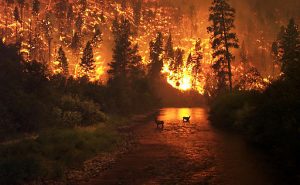
A wildfire in Bitterroot National Forest in Montana, United States, in August 2000.
Credit: John McColgan/USDA.
AGU scientists are available to comment on the science of wildfires and their impacts throughout the summer season, including connections between climate and wildfires, health effects of wildfire smoke, historical wildfire activity, effects on air quality and wildfire impacts on forest ecosystems.
Tim Brown is a Research Professor at the Desert Research Institute and Director of the Western Regional Climate Center in Reno, Nevada. His expertise includes fire-climate and weather connections; the fire environment; applications development for wildland fire management planning, decision-making and policy; the interface between science and decision-making; and the deliberate co-production of knowledge.
Email: [email protected]
Emily Fischer is an Associate Professor in the Department of Atmospheric Science at Colorado State University in Fort Collins, Colorado. Her expertise is on the chemical and physical evolution of smoke, with a particular focus on the western U.S. wildfires.
Email: [email protected]
Douglas Hamilton is an Earth system scientist at Cornell University in Ithaca, New York. He researches how human activity has altered wildfire regimes since the Industrial Revolution and how these regimes may shift in the future. Changing wildfire activity disrupts atmospheric composition and vegetation landscapes with resultant impacts for climate, biosphere nutrient supplies, and society.
Email: [email protected]
Beverly Law is Professor of Global Change Biology & Terrestrial Systems Science in the Department of Forest Ecosystems & Society at Oregon State University in Corvallis. Her expertise is on drought-related mortality in forests and implications of wildfires and management actions on forest carbon and emissions to the atmosphere.
Email: [email protected]
Jennifer Marlon is a Research Scientist at the Yale School of Forestry & Environmental Studies in New Haven, Connecticut. Her expertise is on the long-term history of wildfires in the western U.S. and globally, particularly on fire-climate interactions. She also studies public perceptions of wildfires and other extreme weather events (heat waves, droughts, hurricanes) in the context of human-caused climate change.
Email: [email protected]
Nina Oakley is a is a climatologist at the Center for Western Weather and Water Extremes at Scripps Institution of Oceanography at UC San Diego. Nina studies weather conditions associated with landslides and post-fire debris flows in California. She co-authored a summary of the January 9, 2018 Montecito landslide and published a study on the atmospheric conditions associated with post-fire debris flows in southern California.
Email: [email protected]
Phone: Prefers email contact.
Valerie Trouet is a Professor in the Laboratory of Tree-Ring Research at the University of Arizona in Tucson. Her expertise is in decadal-to-centennial-scale climate variability and its influence on human systems and forest ecosystems. Amongst others, she studies past wildfires and fire-climate interactions in the American West.
Email: [email protected]
Looking for experts in other topic areas? Visit AGU’s Stay Informed page for up-to-date expert lists.